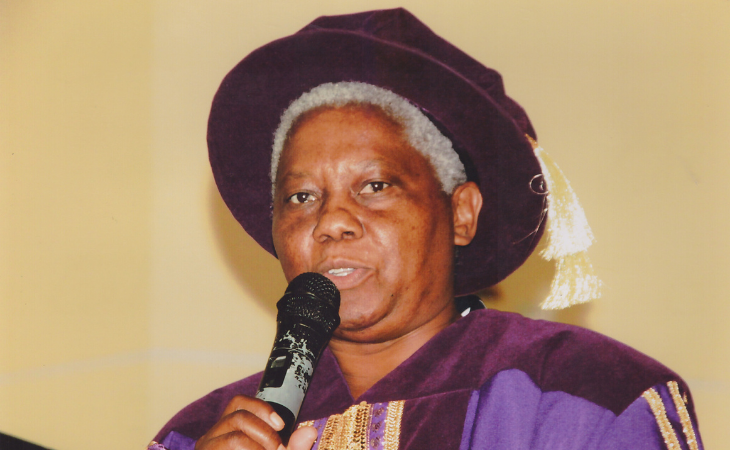Meet the first female University Chancellor in Zambia
What does it take to have a career trajectory marked by a number of firsts? First female University Chancellor in Zambia, Ruth Mubanga, shares her leadership journey with Gemma Munday, Communications Manager at Education Sub Saharan Africa (ESSA).

Could you tell me a bit about your journey so far as a female academic and how you got into this field?
I started as a science teacher in an all-girls school, then moved to a Teacher Training College as a lecturer in the Sciences. I rose in ranks to become an Inspector of schools, the Principal at Nkrumah College of Education Zambia, and later, the Director of Teacher Education and Specialised Services Ministry of Education After retirement, I was engaged at the University of Africa as an advisor. In 2017, I was appointed as the Chancellor of the University of Africa. At the end of 2018, the university had a crisis at a point which led the Vice-Chancellor to resign. Guess what? I was asked to step in as the acting Vice-Chancellor.
FROM The first female Biology Lecturer, TO the first female Chancellor AND MANY MORE FIRSTS IN BETWEEN! How does it feel to be a pacesetter in the higher education sector?
Honestly, it has been a challenging yet exciting experience. As the first female science Lecturer at the Nkrumah College, there was no one to look up to. I was the pioneer so both students and teachers looked up to me as a role model.
"As a principal, there was a lot of resistance from people who did not think I could deliver in my position or was qualified enough. For me that meant working extra hard to show people I have the qualities and capacities to deliver in my position."
Speaking from experience on your road to leadership, do you think there are specific skills needed to be a leader?
It is important to have the ability to influence people and communicate effectively, as miscommunication creates lots of problems. When I became the director at the Ministry of Education, I had to coordinate the teacher education sector and lead national projects. During these moments, it was important for people to recognize me as someone who can lead.
"A leader should exude confidence, be innovative and can embrace failures and manage setbacks. Above all, a leader should be empathetic because you work with people so they need to know you can be understanding in certain situations, yet firm."
Well said Ruth. You mentioned some challenges faced during your experience. What do you think are some barriers women in Zambia face in the quest for leadership positions?
One major challenge I would say affects women is confidence. I have had opportunities during my time at the Ministry of Education where I recommended positions to some women, but they felt they were incapable so turned them down.
"Confidence is one of the biggest obstacles which we need to address so women can confidently feel and say they can lead."
Another challenge is the fact that Zambian women are the main support system in their families so taking a leadership role isn’t their priority. They would choose family or a less demanding role over a challenging leadership position or pursuing their education.
In your line of work, do you think there has been gender equity?
Taking the educational sector, there were certain initiatives we started but unfortunately has been abandoned. For instance, the Ministry of Education made it a policy that for leadership positions, there should always be a 50% male, 50% female proportion. If the Head was a male and the Deputy should be a female or vice versa. This saw an increase in the number of females who took up leadership positions at the senior level. However, in the last 5 years, these policies have been side-lined, so it is not uncommon to have male-dominated senior management meetings.
What would be a good influencing strategy to ensure more female representation in universities?
I think regulators for universities and colleges should publish records of women enrolments in universities and women in leadership roles in education. When they keep publishing these statistics annually, we can have a sense of the issues on the ground and how to solve them. That’s the starting point because if we have fewer women pursuing higher education, there would be fewer women in leadership.
"There should be specific leadership development programmes aimed at building the leadership capacities of women."
This interview is part of our series of interviews with female leaders in education for International Women’s Day 2021.
Find out more about ESSA’s work using evidence to improve female leadership in education here.